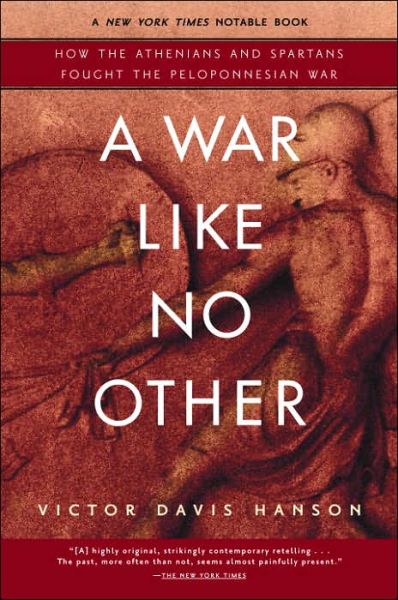A War Like No Other: How the Athenians and Spartans Fought the Peloponnesian War pdf
Par winter carolyn le lundi, novembre 9 2015, 22:17 - Lien permanent
A War Like No Other: How the Athenians and Spartans Fought the Peloponnesian War. Victor Hanson

A.War.Like.No.Other.How.the.Athenians.and.Spartans.Fought.the.Peloponnesian.War.pdf
ISBN: 9780812969702 | 416 pages | 11 Mb

A War Like No Other: How the Athenians and Spartans Fought the Peloponnesian War Victor Hanson
Publisher: Random House Publishing Group
What Real Rape Culture Looks Like →. Apr 11, 2014 - He believed “the growth of the power of Athens, and the alarm which this inspired in Sparta, made war inevitable” (Strassler 16). The Athenian general Laches was even more generous: 'If all the Athenians had fought as bravely as Socrates, the Boeotians would have erected no (victory) statues.' Socrates' last military service The Peloponnesian War (431-404 BC). May 14, 2013 - Halfway through the Peloponnesian War, the Athenians decided to complete their hegemony over the Aegean Sea by capturing the only remaining island not yet under their control, the island of Melos. Hanson is a nationally syndicated columnist and a classicist and historian at Stanford University's Hoover Institution and author of “A War Like No Other: How the Athenians and Spartans Fought the Peloponnesian War.”. Feb 25, 2013 - Historically, the wars that meet these three criteria are: the Peloponnesian war between Athens and Sparta (431-404 B.C.), the Second Punic war between Carthage and Rome (218-201 B.C.), the Thirty Years War (1618-48), The issue is a subtle one: a dominant military power in irreversible relative decline faced with a geopolitical rival with greater war potential will consider preventive war to be necessary if no other option is available to . Feb 3, 2011 - According to Alcibiades, Athens would be the safer victor in the war for Persia, since Athens sought only to rule the sea and the islands; Sparta, on the other hand, sought to free subjects everywhere and were stronger on land, which would be a direct threat to Persia. Like other young Athenian servicemen, Socrates probably had some short peacetime deployments to the borders of Athenian territory, but spent most of his time in Athens itself. Cavalry also fought in “close quarters” (Gaebel 96) to the enemy with lances and swords in addition to javelins for farther distances. By Sparta and more concerned with appearing strong to the rest of the city-states they controlled in the Aegean Sea – for should they let Melos remain free, it may embolden other Athenian tributary states enough to revolt. Zmkc said Why has nothing in history ever captured my imagination like the Peloponnesian wars - I think it's partly because, in them, I can always seem to find parallels for all that has happened since. Hands are occupied while riding a horse, so the rider is not able to carry as many weapons. Varied from soldier to soldier. The cavalry was powerful and made up for the times when others' attempts failed.
Jim Murray's Whisky Bible 2014 book download